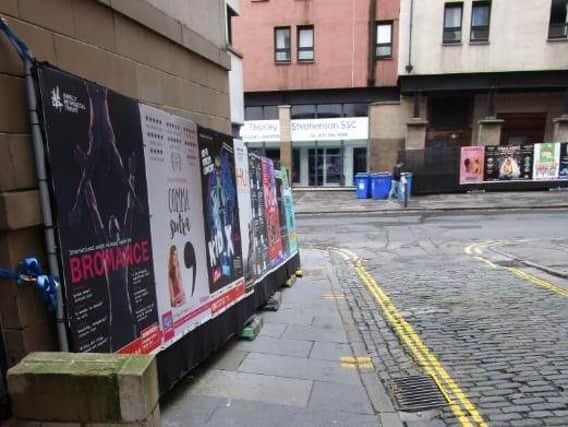No risk checks over 'unacceptable and dangerous' Edinburgh on-street ad ban relaxation for Fringe


It has emerged City of Edinburgh Council did not undertake a risk or health and safety assessment for the relaxation during the Fringe, meaning potential risk to blind, disabled and elderly people was not considered before the overall ban was introduced.
In August, the use of on-street ad was described as “unacceptable and dangerous” by charities.
Advertisement
Hide AdAdvertisement
Hide AdIain Whyte, Conservative group leader at the council, said the lack of a risk assessment was a “major oversight” while Labour councillor Scott Arthur said it was time for the council to put people before profit.
The Transport and Environment committee voted to re-examine the relaxation after a motion passed last week.
The council said risk assessments should have been done by contractors Out of Hand and added the Fringe was an "exceptional" time of the year and on-street adverts cut down on flyposting.
Cllr Whyte said the relaxation reinforced people’s views that there is one rule for Fringe operators and another for year-round residents.
Advertisement
Hide AdAdvertisement
Hide AdHe said: “That strikes me as a major oversight. It’s not hard for members of the public to imagine that there is one rule for Fringe promoters and those tourist businesses and a different rule for other businesses and locals who have to abide by the rules all year round.
Cllr Arthur described it as “quite incredible” that on-street ads during the busiest time of the year were not subject to a risk assessment.
He said: “What sort of message does that send to people with mobility problems? The Council needs to show more ambition, and work with RNIB Scotland and Living Streets to fully understand the risks the jumble of advertising poses to pedestrians. We need to put people before profit."
Stuart Hay, director of Living Streets who had labelled the original relaxation as dangerous, blasted the contractors in charge of the on-street ads.
Advertisement
Hide AdAdvertisement
Hide AdHe said: “It was obvious the contractors gave little consideration to people on foot; creating pinch points on pavements, while some junctions were dangerous to cross.
“The council needs to learn from these mistakes and consider the impact restricted pavement space, particularly from festival advertising, has on people with disabilities.
"The temporary return of street obstructions has highlighted how successful the A board ban has been and why it should be maintained throughout the busy festival period.”
Edinburgh-based sight loss charity RNIB Scotland said they welcomed the review of the relaxation of the ban.
Advertisement
Hide AdAdvertisement
Hide AdA spokesman said: "Blind and partially sighted people have told us that since the on-street advertising ban came into force in November last year they have found it much easier and safer to travel around Edinburgh without the worry of colliding with street clutter.
"While we recognise the benefits that the Fringe brings to the city this doesn't make street clutter doesn't less of an obstacle to people with sight loss or other mobility issues. We'd note, too, that a number of visitors to the city will themselves have the same issues.
"A vital element for any successful 21st century city must be inclusivity. A city that is open and welcoming to everyone, no matter what needs or disabilities they may have. And the key to inclusivity is physical accessibility."
Transport and environment convener, Lesley Macinnes, said: “Edinburgh has been at the forefront of progressing plans to make our streets more accessible and we are one of the few cities in the UK to introduce an A-Board ban, working very closely with groups like Living Streets and the RNIB to make this happen.
Advertisement
Hide AdAdvertisement
Hide Ad“This ban is still very much in place and is helping to reduce clutter and improve accessibility on our streets. The Festival is an exceptional period in Edinburgh’s events calendar, where the city is temporarily transformed to support the huge variety of activities and events taking place.
"An exemption to the ban is in place during this period specifically for official Council-approved event-related signage to be displayed. This helps us limit unauthorised flyposting across the city. Throughout the Festival season we also work closely with event organisers to make sure event advertising structures meet with public safety requirements.
“The advertising strategy for the Festival season is reviewed annually so that it can evolve – indeed the motion I raised earlier this month with the Vice Convener, calling for the Committee’s agreement on reviewing our approach in light of concerns raised, will see us speak with official event organisers to understand how we best do this in advance of next year’s festivities.”